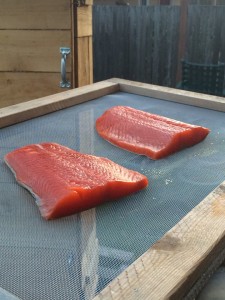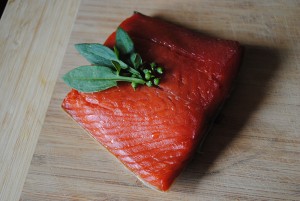In following along with the research question (…insert question verbatum…..) I attempted to replace all basic ingredients in smoked salmon with local ingredients, thereby creating a food that truly has a taste of (one) place. There is one glaring hole in this project which is the use of Alaskan Salmon, which, is some-what local. It is, however, ‘imported’ if you will, to a certain degree. An ideal scenario would be to use salmon caught either from the Salish Sea or the Straight of Juan de Fuca. It is not salmon season however, so this is simply not possible right now.
(insert photo of salt and honey here)
That aside, the next series of ingredients in making smoked salmon is the brine. The essential ingredients of the brine are water, salt and sugar. The salt and sugar are preserving agents, while the water simply allows the fish to be submerged in them. In the first trial I used a generic bulk brand of local sea salt for which I was not able to obtain proof of origin, other than its label of being “sourced” and “produced” in the Washington. We’ll give them the benefit of the doubt, this time, even though it’s rather ‘fishy’. The sugar I used was L.R. Rice brand raw and unfiltered clover honey labeled “local northwest” yet, packed in Colorado, this again is a bit fishy.
I brined the sockeye salmon in about a quart and a half of pure water using 4 tablespoons of sea salt and 5 tablespoons of honey for 6 hours. The salmon was then air dried in the refrigerator for another 6 hours.
(insert photo of juniper berries)
The salmon was then smoked using alder wood chips (native to the NW) for 8 hours. Evenly spaced over the 8 hour period dried juniper berries (bulk sourced from Washington) were added onto the alder chips, with the intention to augment the flavor.
The interesting challenge with the juniper berries were that they are waxy and resinous and are fickle when it comes to smoking, the have a ‘critical mass’, when crowded in a foil tray with holes on the bottom (which makes isolating wood chips easy) they tend to spontaneously combust. When this happens they release a very heavy, strong, noxious, tarry smoke which really wears on the lungs. When the berries are dispersed lightly and evenly over the lump charcoal the release a less tarry smoke that has a intense but pleasant aroma.
The verdict?
I did not smoke a control group fillet of simply alder smoked salmon. Trial 1 results: alder smoke, in sockeye, creates a nice deep-forest ‘woody’, ‘beachy’, aroma in the salmon which I find absolutely palatable. It was hard to tell if the Juniper berries, of which around two ounces were used, imparted much of a flavor. Which was a surprise given how strong their aroma was during the smoking. However I believed there to be a deep rich almost bitter ‘note’ to the fish. I attributed this to the juniper berries.
Above photo: Juniper alder smoked salmon garnished with sorrel and fresh juniper berries.



